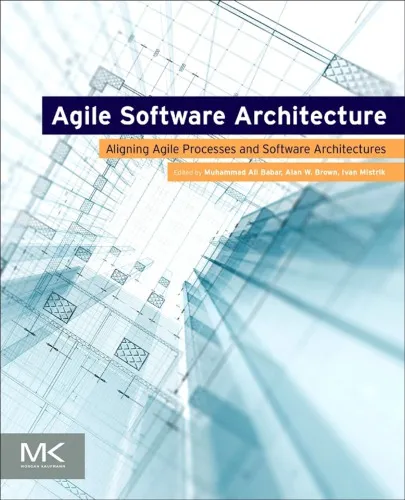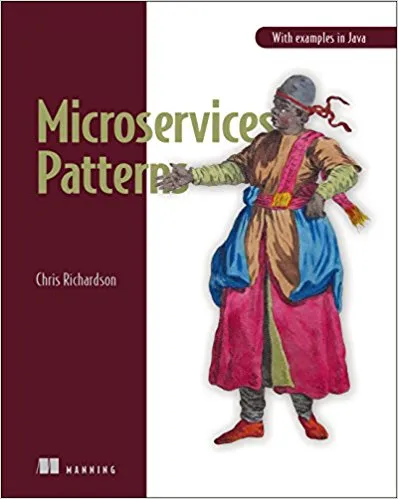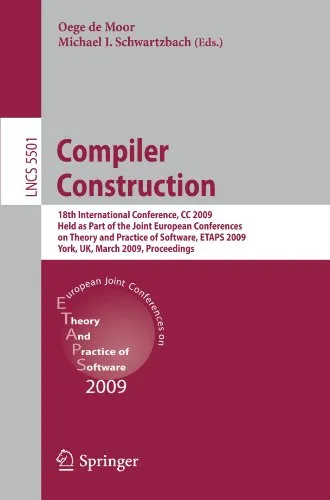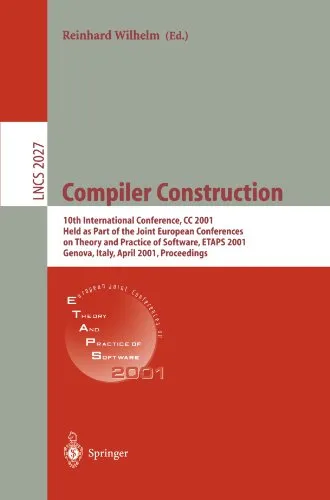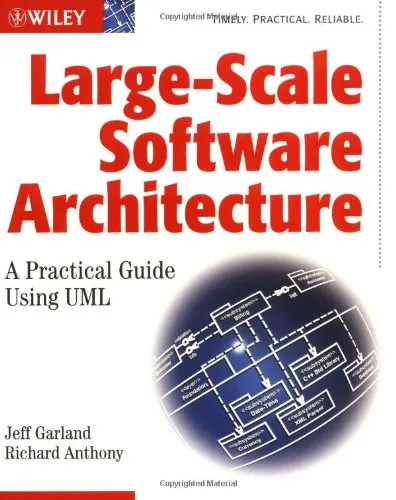Agile Software Architecture
4.8
بر اساس نظر کاربران

شما میتونید سوالاتتون در باره کتاب رو از هوش مصنوعیش بعد از ورود بپرسید
هر دانلود یا پرسش از هوش مصنوعی 2 امتیاز لازم دارد، برای بدست آوردن امتیاز رایگان، به صفحه ی راهنمای امتیازات سر بزنید و یک سری کار ارزشمند انجام بدینکتاب های مرتبط:
معرفی کتاب Agile Software Architecture
کتاب Agile Software Architecture توسط بابَر محمد، آلن براون و ایوان مستریک نوشته شده و یکی از منابع کلیدی برای متخصصانی است که به دنبال بهکارگیری اصول Agile در طراحی و معماری نرمافزار هستند. این کتاب به بررسی چالشهای معماری نرمافزار در محیطهای Agile میپردازد و راهحلهایی عملی و مبتنی بر تجربه ارائه میدهد.
خلاصهای دقیق از کتاب
کتاب Agile Software Architecture به کسانی که در نقشهای مهندسی نرمافزار، معماری سیستم و مدیریت فنی فعالیت میکنند، کمک میکند تا تعادلی موثر بین سرعت توسعه و حفظ ساختار بلندمدت نرمافزار برقرار کنند. در دنیای تکنولوژی امروز که سرعت تغییرات بیسابقه است، استفاده از متدولوژیهای Agile در ترکیب با طراحی قوی نرمافزار، چالشها و فرصتهای متنوعی را به همراه دارد.
مطالب کتاب شامل موضوعاتی نظیر اصول طراحی ماژولار، چگونگی همکاری معماران و تیمهای توسعه، تصمیمگیری سریعتر در محیطهای روان Agile، و تطبیق معماری با تغییرات الزامات است. نویسندگان با ارائه مثالهای واقعی، به طور کاربردی نشان میدهند که چگونه میتوان تصمیمگیری معماری را در پروژههای Agile بهینه کرد.
اصلیترین درسهایی که از این کتاب میآموزیم
- چگونگی ادغام تصمیمات Architectural در فرآیندهای Agile.
- اهمیت اتخاذ تصمیمات معماری بر اساس نیازهای کسبوکار و اهداف بلندمدت.
- نکات کاربردی برای پرهیز از مشکلات رایج مانند Technical Debt.
- پیادهسازی معماریهایی که میتوانند با تغییرات مداوم در تیمها و پروژهها سازگار باشند.
- شناخت بهتر نقش معمار نرمافزار در محیط Agile و تعامل موثر با تیمهای توسعه.
جملات معروف از کتاب
"Software architecture in agile development is not a phase; it is a continuous practice that evolves alongside the product itself."
"The balance between upfront design and emergent design is key to an agile approach to architecture."
"The role of the architect is to enable autonomy, not control."
چرا این کتاب مهم است؟
در دنیای نرمافزار بهطور مکرر دیده شده که تناقضاتی بین سرعت توسعه و کیفیت معماری به وجود میآید. کتاب Agile Software Architecture به خوانندگان نشان میدهد که چگونه میتوان این دو جنبه را به طور موثری با هم ترکیب کرد. این کتاب از تجربیات واقعی و پروژههای پیچیده بهره میگیرد تا بینشی عملی برای معماران نرمافزار و تیمهای توسعه فراهم کند.
همچنین، تمرکز بر انعطافپذیری و ارتباط مؤثر میان ذینفعان پروژه باعث شده که این کتاب منبعی ارزشمند برای رهبران فنی و مدیران پروژه باشد. آموزش قدمبهقدم استفاده از اصول Agile در معماری نرمافزار، از ویژگیهای بارز این کتاب است که آن را از سایر منابع متمایز میکند.
Introduction to Agile Software Architecture
In today's ever-evolving world of software development, the convergence of agility and architecture has become crucial. The book Agile Software Architecture, authored by Babar, Muhammad; Brown, Alan; and Mistrik, Ivan, explores how embracing agility enhances software architecture practices. It serves as a guide to harmonizing architectural principles with the dynamic nature of agile development frameworks.
The book delves into the challenges, solutions, and techniques that enable software architects and development teams to build robust, scalable, and maintainable systems. Focusing on the intersection of agility and structured design, it bridges the gap between the need for meticulous architectural planning and the flexibility required in agile approaches.
Detailed Summary of the Book
The essence of Agile Software Architecture lies in balancing structure with adaptability, particularly in fast-paced, iterative environments. The book introduces readers to the principles and methodologies for maintaining architectural integrity while working in agile development settings.
The authors methodically unpack the intricacies of agile architecture by focusing on key principles like scalability, maintainability, and resilience while addressing challenges specific to agile frameworks. The book also emphasizes collaboration between stakeholders, including developers, architects, product owners, and other technical roles, to ensure architectural decisions align with project goals and customer needs.
Throughout its chapters, the book presents practical strategies for integrating architecture with agile practices such as Scrum, Kanban, and Extreme Programming (XP). Concrete examples and real-world case studies are used to demonstrate how agile principles can be seamlessly incorporated into architectural workflows. From incremental architectural refactoring to just-in-time architecture decisions, the authors provide actionable insights that both novice and experienced practitioners will find invaluable.
Importantly, the book debunks the misconception that agility and software architecture are at odds. Instead, it advocates for a collaborative, iterative approach to system design that embraces flexibility without compromising software quality or reliability.
Key Takeaways
- Achieving a harmonious balance between agile development and architectural structure.
- Practical strategies for incremental architectural refactoring in iterative cycles.
- Insights into stakeholder collaboration and aligning technical decisions with business goals.
- Proven techniques for maintaining architectural quality amidst rapid software delivery.
- The importance of adaptability and continuous learning in architectural roles.
Famous Quotes from the Book
"An effective software architecture is not set in stone, but evolves continuously alongside the system and the team."
"Agile architecture is about enabling adaptability without sacrificing long-term goals."
"Architectural decisions are best made in the context of collaboration, not isolation."
Why This Book Matters
In a software development landscape where agility often takes precedence, the role of architecture cannot be overlooked. Agile Software Architecture shines as a vital resource for software professionals striving to deliver high-quality, innovative solutions within tight deadlines. By promoting a culture of continuous learning, collaboration, and iterative improvement, the book empowers teams to build systems that are not only agile but also architecturally sound.
For software architects, this book highlights the importance of adapting to modern development practices by embracing agility. For developers and team leads, it provides insights into how architecture plays an integral role in the software lifecycle. The book is a beacon of knowledge for those who seek to align business goals with technical excellence, ensuring the success of both their projects and their teams in a fiercely competitive market.
Ultimately, Agile Software Architecture is a testament to the possibilities of combining agility with structured design for unprecedented software success, making it a must-read for anyone in the software development or architecture domain.
دانلود رایگان مستقیم
شما میتونید سوالاتتون در باره کتاب رو از هوش مصنوعیش بعد از ورود بپرسید
دسترسی به کتابها از طریق پلتفرمهای قانونی و کتابخانههای عمومی نه تنها از حقوق نویسندگان و ناشران حمایت میکند، بلکه به پایداری فرهنگ کتابخوانی نیز کمک میرساند. پیش از دانلود، لحظهای به بررسی این گزینهها فکر کنید.
این کتاب رو در پلتفرم های دیگه ببینید
WorldCat به شما کمک میکنه تا کتاب ها رو در کتابخانه های سراسر دنیا پیدا کنید
امتیازها، نظرات تخصصی و صحبت ها درباره کتاب را در Goodreads ببینید
کتابهای کمیاب یا دست دوم را در AbeBooks پیدا کنید و بخرید
1430
بازدید4.8
امتیاز0
نظر98%
رضایتنظرات:
4.8
بر اساس 0 نظر کاربران
Questions & Answers
Ask questions about this book or help others by answering
No questions yet. Be the first to ask!
